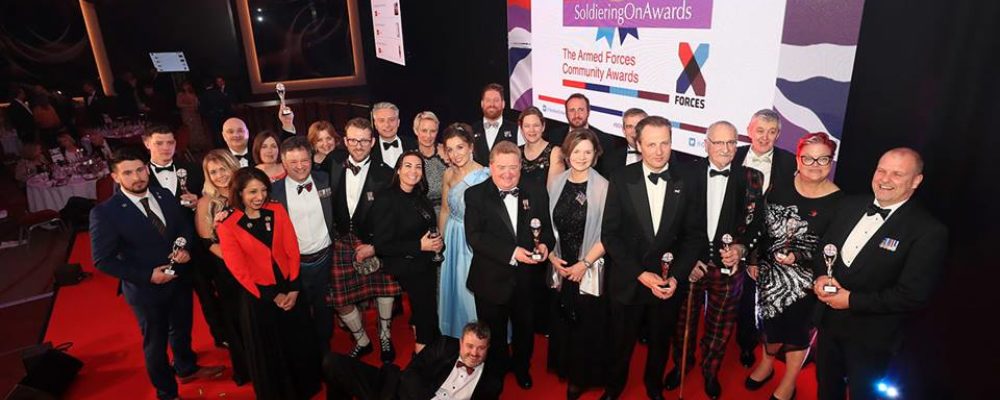Following this year’s Soldiering On Awards, the Federation of Small Businesses (FSB) has granted honorary memberships to four firms recognised in the 5 April ceremony. [1] Armed with those new credentials, those businesses will be able to take advantage of the FSB’s extensive range of support services and plug into a readymade network of like-minded firms that can share valuable experiences.
Held annually, the Soldiering On Awards acknowledge achievements in enterprise that have stemmed from the UK’s community of ex-forces veterans, demonstrating the breadth of opportunities that await them after their military careers.
With that in mind, what really stands out from the FSB’s new honorary members is the sheer variety of business types on offer – and the extent to which working on those firms has benefited their founders. The winning companies are:
1. Sinah Common Honey (Hayling Island, Hampshire; Community Impact winner). Founded by John Geden, following a 32-year career in the military and police force that left him with complex PTSD. Struggling to find civilian employment, Geden decided to turn his love of beekeeping into a business and launched Sinah Common Honey. He now manages 200 hives, produces two tonnes of honey per year and runs beekeeping courses for veterans. He is also about to launch a cosmetic product, with the proceeds going to military charities.
2. The Afghan Rug Shop (Hebden Bridge; Community Impact Award, highly commended). Owned by RAF veteran James Wilthew, The Afghan Rug Shop is the only retail presence outside Afghanistan dedicated purely to selling the country’s unique handmade rugs. Wilthew sources, imports and sells quality crafts and helps the weaving families who supply him to have sustainable incomes. He is the only UK retailer to be accredited with a Label-STEP licence for Fairtrade rugs.
3. UK Connect (Worplesdon, Surrey; Scale Up Award). Founded by former soldier PJ Farr to provide broadband connectivity to previously unconnected locations, such as new building sites. Realising that the battlefield is better connected than some areas of the UK, Farr launched his firm with just £1000. It has since enjoyed exceptional growth, secured contracts with FTSE 100 companies and is now turning over more than £4 million per year.
4. Network Training Partnership (Margaretting, Essex; Start Up Award) Provides integrated training and recruitment solutions to the automotive, logistics and recovery industries, with an additional focus on supporting the veteran community. All instructors are ex-military and the firm provides free training and access to jobs.
FSB executive chairman – and former reservist – Mike Cherry said: “It’s an honour to recognise these incredible businesses that have all been started, and are run by, those who have previously served. Their stories are all inspiring.”
What does that variety of business types say about veterans’ grasp of organisational leadership – and how they should frame their aspirations when they are preparing to enter civilian life?
The Institute of Leadership & Management head of research, policy and standards Kate Cooper says: “This says so much about what we really mean by ‘transferrable skills’. But perhaps that term, in light of these achievements, is too narrow. What we’re looking at here are transferrable mindsets, and entire approaches to work.
“It may be the case that some of the logistical processes that veterans engage with in civilian life will have different names to their military labels. But traditionally, many veterans steer towards project management in their post-military careers, because the fundamental tenets of that broad discipline carry over readily from the services to the private sector.”
Cooper stresses: “What these awards are saying, with great resonance, is: ‘Don’t be limited by your past experiences or qualifications.’ Because if you’re bringing i) the ability to work hard; ii) resilience – the capacity to bounce back if things go wrong; iii) perseverance and iv) discipline, then you will have all the assets you need for an entrepreneurial endeavour.”
She notes: “One point that I don’t think is emphasised well or often enough is how the military functions as a natural wellspring of leadership development and collaboration. Living away from home in close proximity with your colleagues for long periods of time – and being unable to see your family every evening for the relief from work that so many of us take for granted – places unique demands upon your people skills. It requires you to widen your capabilities to work with and tolerate others, to understand difference and to keep relationships going.
“So, perhaps a higher concentration on those personal skills is the starting point for post-military careers, rather than the more traditional approach where you’re trying to match yourself with certain occupations. That ability to work with people is something that you can take from one industry to another. It works with customers. It works with colleagues. It works with people you are trying to inspire, and in any situation where you need to manage upwards.”
Cooper adds: “If you have a good idea for a business, and you market it correctly, engage with a customer base and manage your finances, those factors will be strong predictors of success. But if you have those military-level people skills, resilience and discipline, too, you will have an even greater advantage.”
For further insights on the themes raised in this blog, check out the Institute’s research report Leadership Redeployed
Source ref: [1]
Image of finalists and winners at the 2019 Soldiering On Awards courtesy of the Soldiering On Facebook page

